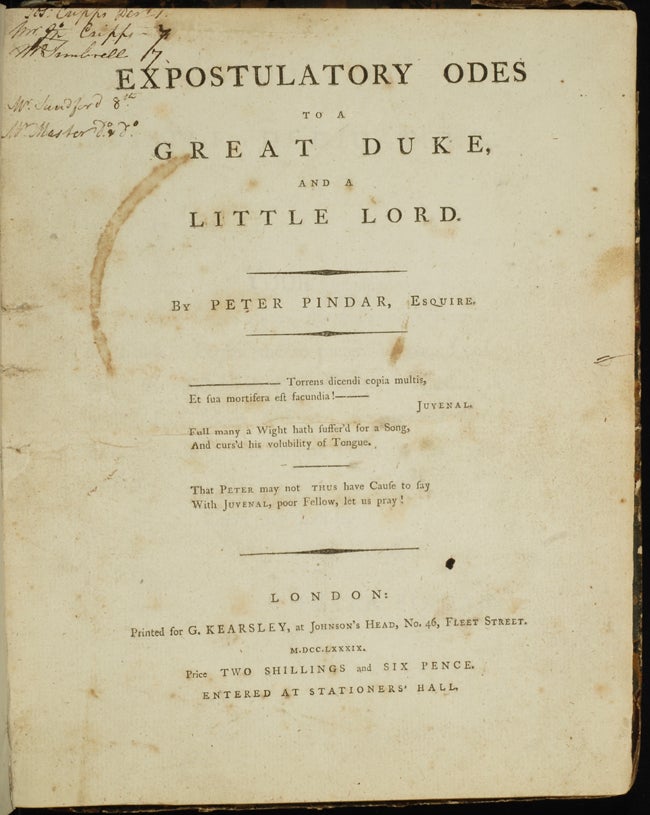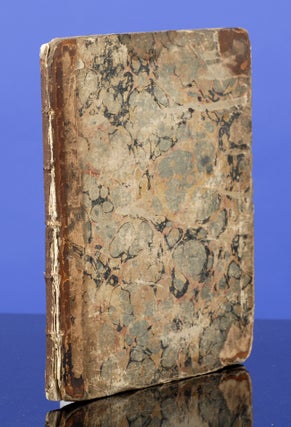Expostulatory Odes to a Great Duke, and a Little Lord.
London: Printed for G. Kearsley, at Johnson's Head, No. 46, Fleet Street, 1789. Item #00848
Satires With An Irresistible Mix of Coarseness and Genuine Good Humour
The Scarce Suppressed Edition
[WOLCOT, John]. PINDAR, Peter. Expostulatory Odes to a Great Duke, and a Little Lord. By Peter Pindar, Esquire. London: Printed for G. Kearsley at Johnson's Head, 1789.
First edition, suppressed. Reissued by Kearsley later in the same year as a New Edition, and in a pirated edition out of Dublin. Quarto in 2s (10 3/16 x 8 1/4 in; 258 x 206 mm). 56 pp.
Contemporary quarter calf over marbled boards, worn. Front joint pulling. Contemporary repairs to margin of leaf O2 and to gutter margin of pp. 2-3.. Contemporary inked notes and stain to titlepage. A good copy of a volume scarce in this, it's original incarnation.
"John Wolcot [pseud. Peter Pindar] (bap. 1738, d. 1819), poet and satirist. In 1785 appeared the first canto of The Lousiad: an Heroi-Comical Poem, lampooning George III for a rumoured incident in which the monarch, on finding a louse on his plate, ordered the head-shaving of his cooks. Many others followed including: Ode upon Ode, or, A Peep at St James's in 1787, as well as further cantos of The Lousiad.
"These anti-royalist satires with their irresistible mix of coarseness and genuine good humour proved immensely popular. In 1785 the cover price of 1s. more than doubled, and Dublin pirate editions began to appear. Wolcot had created a popular market, and at the height of his reputation sales numbered tens of thousands. The popularity of these rumbustious productions aroused concern in Whitehall, and it would seem that negotiations began with Wolcot to silence his attacks on the throne. As ever, Wolcot was susceptible to the prospect of financial gain, and a first payment of £300 had been made before he withdrew his compliance and returned the money, whether for financial or more principled reason is unknown.
"But it is for his satires that he is justly famous. His two great subjects are the Royal Academy, and later the court and person of George III. As a satirist he combines two attributes rarely found together: he is both caustic and genuinely funny. His satirical odes are bursting with a rumbustious energy, a mischievous relish for absurdity, and a technical dexterity with verse which echoes his great hero Samuel Butler and adumbrates his admirer Byron.
"Wolcot was immensely popular at the height of his career. In 1796 Wordsworth wrote: ‘What shall be said of Boileau, and Pope, and the redoubtable Peter? These are great names’ (Early Letters of William and Dorothy Wordsworth, ed. E. de Selincourt, 1935, 156). His reputation spread abroad, as is evidenced by the incident of the visit of the Polish General Kosciuszko to London in 1797, where the distinguished visitor asked to meet Peter Pindar, whose satires had sustained him while imprisoned in St Petersburg. Nevertheless Wolcot established no literary school, though he left imitators after his death. His poetry reveals a great sensitivity to the social evils and injustices of the time—slavery, poverty, game laws, war profiteering—and his reviews show him to be kindly disposed to new writers and to women authors. With his lucrative subject of the king and court he was able to live by his pen: ‘The only man who really made money by poetry in the last decades of the 18th century was Wolcot’ (A. S. Collins, The Profession of Letters, 1929, 92).
"When asked by a lady if he had been a good subject to George III, he is said to have replied ‘I do not know anything about that, Madam, but I do know the King has been a devilish good subject for me’ [Redding, Recollections, 1.258]" (Oxford DNB Online).
"Peter Pindar" became the most prolific and successful burlesque poet of the later eighteenth century. His particular targets were the Royal Academy and the royal family.
"Wolcott was always ready to libel kings, lords, or commons, without mercy" (Allibone, p.2811).
"Dr. Wolcott…the most unsparing calumniator of his time" (Sir Walter Scott, Lockhart's Scott, ch. 73).
Scarce in the marketplace.
Halkett and Laing 865. NCBEL II,695.
Price: $250.00

 I have been in the rare and antiquarian book business for over forty years; my family has been in the rare books business since 1876. Rare books are in my blood.
I have been in the rare and antiquarian book business for over forty years; my family has been in the rare books business since 1876. Rare books are in my blood.

